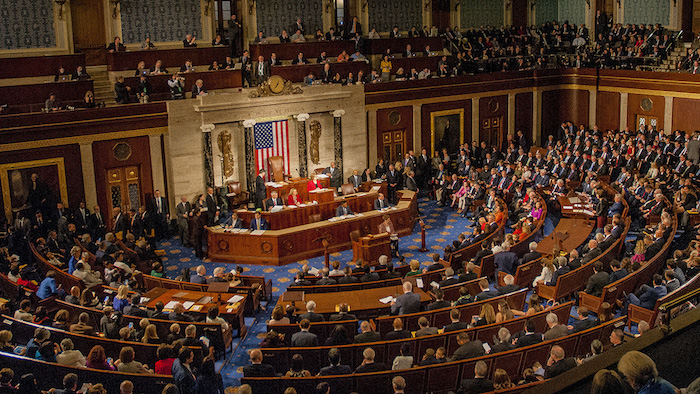
View, from the balcony, of congressmen and congresswomen on the house floor as the 115th Congress is called into session on its opening day, Washington DC, January 3, 2017. (Photo by Mark Reinstein/Corbis via Getty Images)
The US Senate on Sunday moved forward on a measure aimed at reopening the federal government and ending a 40-day shutdown that has sidelined federal workers, delayed food aid, and disrupted air travel across the country.
In a procedural vote, senators advanced a House-passed bill that will be amended to fund the government until January 30 and include a package of three full-year appropriations bills. If the Senate ultimately passes the amended measure, it must still be approved by the House of Representatives and sent to President Donald Trump for his signature, a process that could take several days.
Under a deal struck with a group of Democrats who had resisted their party’s leadership, Republicans agreed to a December vote on extending Affordable Care Act (ACA) subsidies. These subsidies, which help lower-income Americans pay for private health insurance, are due to expire at the end of the year and have been a key Democratic priority during the funding standoff.
The vote to advance the bill passed by a 60-40 margin, the minimum required to overcome a Senate filibuster.
“It looks like we’re getting very close to the shutdown ending,” President Trump told reporters at the White House prior to the vote.
The legislation would prohibit federal agencies from firing employees until January 30, a major win for federal worker unions and their allies. The measure would also temporarily stall Trump’s long-running campaign to downsize the federal workforce.
As of the start of Trump’s second term, roughly 2.2 million civilians worked for the federal government, according to official records. At least 300,000 employees are expected to leave their jobs by the end of this year due to the downsizing effort.
The bill also provides back pay for all federal employees, including members of the military, Border Patrol agents, and air-traffic controllers many of whom have worked without pay since the shutdown began.
When the Senate reconvenes on Monday, Republican leaders will attempt to secure bipartisan consent to bypass Senate rules and move the bill to final passage quickly. Without that agreement, the chamber would have to follow standard procedures, potentially extending the shutdown into next weekend.
“It was a good vote tonight,” Senate Majority Leader John Thune told reporters after the chamber adjourned Sunday. “Hopefully, we’ll get an opportunity tomorrow to set up the next votes. Of course, that’s going to take some cooperation and consent.”
Sunday’s deal was brokered by Democratic Senators Maggie Hassan and Jeanne Shaheen of New Hampshire, and Independent Senator Angus King of Maine, according to a person familiar with the discussions.
“For over a month, I’ve made clear that my priorities are to both reopen government and extend the ACA enhanced premium tax credits. This is our best path toward accomplishing both of these goals,” Shaheen wrote on X (formerly Twitter).
Senate Minority Leader Chuck Schumer, the top Democrat, voted against the measure a move that drew criticism from some members of his party.
“Senator Schumer is no longer effective and should be replaced,” wrote Representative Ro Khanna on X. “If you can’t lead the fight to stop healthcare premiums from skyrocketing for Americans, what will you fight for?”
Sunday marked the 40th day of the shutdown, the longest in US history, which has left federal workers unpaid and disrupted essential services including food aid, national parks, and air travel. Staffing shortages among air traffic controllers have raised fears of major travel delays during the busy Thanksgiving holiday season later this month.
Senator Thom Tillis, a Republican from North Carolina, said growing public frustration and the economic impact of the shutdown pushed the Senate toward a resolution. “Temperatures cool, the atmospheric pressure increases outside and all of a sudden it looks like things will come together,” Tillis said.
White House economic adviser Kevin Hassett warned that if the government remains closed much longer, US economic growth could turn negative in the fourth quarter, particularly if air travel disruptions persist into Thanksgiving, which falls on November 27 this year.
The wrangling on Capitol Hill came as Trump renewed his push to replace ACA subsidies with direct payments to individuals. The subsidies, which have helped double ACA enrollment to 24 million since their expansion in 2021, are a central issue in the shutdown standoff. Republicans have insisted they will only address the matter once government funding is restored.
Trump wrote on Truth Social that the subsidies represent “a windfall for Health Insurance Companies, and a DISASTER for the American people,” adding, “I stand ready to work with both parties to solve this problem once the government is open.”
Americans preparing to shop for 2026 Obamacare health plans are facing what analysts say will be a more than doubling of average monthly premiums, as the pandemic-era subsidies are set to expire at year’s end. The ACA open enrollment period, however, runs through January 15, leaving time for potential legislative action to extend the credits into next year.
Erizia Rubyjeana



